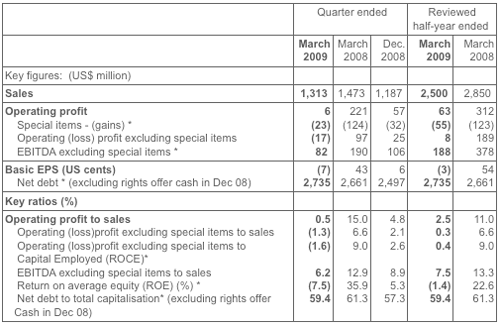Sappi Reports loss for 2Q
Press release from the issuing company
Commenting on the results, Sappi chief executive Ralph Boëttger said:
“The quarter was characterised by a sharp decline in our sales volumes, which was driven by declines in demand for coated paper and pulp in our major markets. Average prices realised by the group in the quarter were 6% lower in US dollar terms than a year ago mainly as a result of the sharp fall in pulp prices, which fell 32% relative to a year earlier. Prices realised for coated paper were higher than in the corresponding quarter a year ago. We curtailed production extensively in each of our regions during the quarter to match supply with demand and reduce inventories. Raw material, in particular pulp, and energy prices were lower in the quarter compared to the prior quarter and corresponding quarter last year. This had some effect on costs in the quarter; however, we expect that a greater effect on costs will be apparent in our third quarter now that higher cost inventories have been depleted

Net cash generated (excluding cash invested in the Acquisition) was US$75 million for the quarter compared to an outflow of US$108 million a year ago.
Our liquidity situation is soundly managed. At March Sappi had cash and cash equivalents of US$711 million and undrawn commitments under the revolving credit facility of US$266 million. We do not have any major borrowings maturing in the next 12 months.
While the recently acquired European mills were also impacted by low operating rates as a result of global economic conditions, the integration of the Acquisition has progressed well and the achievement of our previously announced synergies of Euro 120 million per annum within 3 years is on track.”
Outlook
Looking forward, Boëttger commented:
“The general economic outlook and market conditions remain depressed. In these circumstances we expect demand for our products to remain weak and we will therefore continue to curtail production to match supply with demand.
It has been difficult to identify the extent to which the fall in apparent demand for our products is an inventory effect, but it appears that the decline of inventories in the downstream supply chain has been significant. We are of the opinion that downstream inventories are stabilising and therefore expect apparent demand to start improving slightly in many of our markets.
Demand for chemical cellulose, particularly in Asia, has started to improve and we are continuing to ramp up production at Saiccor Mill. We expect the operating rate to be close to the total expanded capacity by our financial year end. Pricing, however, is expected to remain weak for the rest of the year. The other Southern African businesses will continue to manage production to match demand. The Rand has recently strengthened relative to the US Dollar, which, if sustained, will put pressure on margins.
In Europe stabilisation of downstream inventories is expected to help improve the supply/demand balance. M-real ceased coated fine paper production at Hallein and Gohrsmühle at the end of April 2009. We were selling the output of these mills for M-real on an agency basis and therefore expect the operating rates of our own mills to improve following this cessation as we transfer this production to our mills. This, together with the continued achievement of Acquisition synergies, is expected to improve the region’s profitability.
In North America we do not expect a significant market improvement this year. The actions taken to restructure the business including suspending operations at Muskegon Mill are expected to help improve profitability.
Although market conditions remain difficult and there is still little visibility, we expect our profitability to improve in the next quarter as a result of the actions we have taken to manage costs, continued declines in input costs and the gradual achievement of Acquisition synergies.
Prioritising cash generation and liquidity remains our critical objective as we stated in our trading update at the group’s Annual General Meeting in March. Each of our operating businesses is implementing production curtailment and variable and fixed cost reduction plans to minimise the cash impact of the current weak market conditions, including the suspension of operations at Muskegon Mill. We are also tightly managing working capital down to minimum levels without compromising on service excellence. We are targeting a further reduction in working capital by our financial year end. In addition, we are reducing capital expenditure to a minimum. In the current financial year we expect capital expenditure in our operations to be below US$200 million compared to US$505 million last year. As a result of these actions we expect positive cash generation for the full financial year.
Given the weak global market conditions, we are expecting the rest of 2009 to remain challenging. Our actions and plans are focused on dealing with these tough market conditions and importantly to ensure that Sappi develops even closer relationships with our customers through the quality of our service and continued improvements in efficiencies and remains well positioned to take full advantage of our leading positions in coated graphic paper and chemical cellulose when markets start to recover.”
- Questions to ask about inkjet for corrugated packaging
- Can Chinese OEMs challenge Western manufacturers?
- The #1 Question When Selling Inkjet
- Integrator perspective on Konica Minolta printheads
- Surfing the Waves of Inkjet
- Kyocera Nixka talks inkjet integration trends
- B2B Customer Tours
- Keeping Inkjet Tickled Pink
© 2024 WhatTheyThink. All Rights Reserved.














